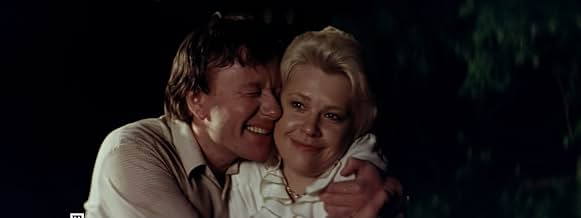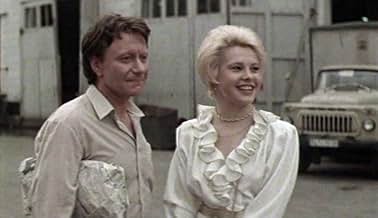Andrey Mironov(1941-1987)
- Actor
- Director
- Music Department
Andrei Mironov was a Soviet comedian known for
The Diamond Arm (1969)
He was born Andrei Aleksandrovich Menaker on March 8, 1941, in Moscow. His father, Aleksandr Semenovich Menaker, and his mother, Mariya Mironova, were famous actors in the Soviet Union. From 1958-1962 he studied acting at the Moscow Shchukin School. From 1962-1987 Mironov was a permanent member of the trope at the Moscow Theatre of Satire.
In 1961, while being a student of acting school, Mironov made his film debut in 'A esli eto lyubov?', by director Yuli Raizman. He became famous after his roles in My Younger Brother (1962), written by Vasiliy Aksyonov and directed by Aleksandr Zarkhi, and in '3+2' (1962), directed by Genrikh Oganisyan. Mironov did a nice performance in a supporting role in Watch Out for the Automobile (1966) (Watch Out for the Automobile 1966), by director Eldar Ryazanov. In it Mironov worked with the stellar acting ensemble, including such actors, as Innokentiy Smoktunovskiy, Oleg Efremov, Anatoliy Papanov, Georgi Zhzhyonov, Evgeniy Evstigneev, Olga Aroseva, Donatas Banionis, and others.
Andrei Mironov is best known for his brilliant performance in supporting role as Kozodoev, a sloppy tourist turned involuntary jewel-smuggler in popular comedy The Diamond Arm (1969) (The Diamond Arm 1968), by director Leonid Gaidai. After this film Mironov became a superstar in the Soviet Union. He worked with an outstanding ensemble of stars, such as Yuriy Nikulin, Anatoliy Papanov, Nina Grebeshkova, Nonna Mordyukova, and other popular Russian actors. The film became the biggest box-office hit ever in the Soviet Union with theatrical admissions over 76,000,000 in the year 1969. It still remains popular after many decades. In the 1995 national poll The Diamond Arm (1969) (The Diamond Arm 1968) was voted the best Russian-Soviet film of all time.
Andrei Mironov was among the most popular Russian actors during the 1960s, 1970s, and 1980s. He was highly regarded for his distinguished contribution to comedy. Among his best works was his interpretation of the classic character Ostap Bender in _"12 stulev" (1977) (mini)_ (Twelve chairs 1977), by director Mark Zakharov. There his partners were Anatoliy Papanov, Rolan Bykov, Georgiy Vitsin, Oleg Tabakov, Aleksandr Abdulov, and others. Mironov also worked with Mark Zakharov in An Ordinary Miracle (1979) (An Ordinary Miracle 1978), where his partners were Aleksandr Abdulov, Irina Kupchenko, Evgeniy Leonov, Evgeniya Simonova, Yekaterina Vasilyeva, and Oleg Yankovskiy.
Andrei Mironov was designated People's Artist of Russia, and also received awards at Soviet film festivals. He had a apoplexy and collapsed during his performance on stage, in the arms of his friend and partner Aleksandr Shirvindt, just minutes before the end of the show. Mironov died of a brain hemorrhage aged 46, on August 16, 1987, only thirteen days after the death of his best film partner Anatoliy Papanov. Andrei Mironov was laid to rest in the Vagankovo Cemetery in Moscow, Russia. He was survived by his wife, actress Ekaterina Golubkina, and their daughter, actress Maria Mironova.
He was born Andrei Aleksandrovich Menaker on March 8, 1941, in Moscow. His father, Aleksandr Semenovich Menaker, and his mother, Mariya Mironova, were famous actors in the Soviet Union. From 1958-1962 he studied acting at the Moscow Shchukin School. From 1962-1987 Mironov was a permanent member of the trope at the Moscow Theatre of Satire.
In 1961, while being a student of acting school, Mironov made his film debut in 'A esli eto lyubov?', by director Yuli Raizman. He became famous after his roles in My Younger Brother (1962), written by Vasiliy Aksyonov and directed by Aleksandr Zarkhi, and in '3+2' (1962), directed by Genrikh Oganisyan. Mironov did a nice performance in a supporting role in Watch Out for the Automobile (1966) (Watch Out for the Automobile 1966), by director Eldar Ryazanov. In it Mironov worked with the stellar acting ensemble, including such actors, as Innokentiy Smoktunovskiy, Oleg Efremov, Anatoliy Papanov, Georgi Zhzhyonov, Evgeniy Evstigneev, Olga Aroseva, Donatas Banionis, and others.
Andrei Mironov is best known for his brilliant performance in supporting role as Kozodoev, a sloppy tourist turned involuntary jewel-smuggler in popular comedy The Diamond Arm (1969) (The Diamond Arm 1968), by director Leonid Gaidai. After this film Mironov became a superstar in the Soviet Union. He worked with an outstanding ensemble of stars, such as Yuriy Nikulin, Anatoliy Papanov, Nina Grebeshkova, Nonna Mordyukova, and other popular Russian actors. The film became the biggest box-office hit ever in the Soviet Union with theatrical admissions over 76,000,000 in the year 1969. It still remains popular after many decades. In the 1995 national poll The Diamond Arm (1969) (The Diamond Arm 1968) was voted the best Russian-Soviet film of all time.
Andrei Mironov was among the most popular Russian actors during the 1960s, 1970s, and 1980s. He was highly regarded for his distinguished contribution to comedy. Among his best works was his interpretation of the classic character Ostap Bender in _"12 stulev" (1977) (mini)_ (Twelve chairs 1977), by director Mark Zakharov. There his partners were Anatoliy Papanov, Rolan Bykov, Georgiy Vitsin, Oleg Tabakov, Aleksandr Abdulov, and others. Mironov also worked with Mark Zakharov in An Ordinary Miracle (1979) (An Ordinary Miracle 1978), where his partners were Aleksandr Abdulov, Irina Kupchenko, Evgeniy Leonov, Evgeniya Simonova, Yekaterina Vasilyeva, and Oleg Yankovskiy.
Andrei Mironov was designated People's Artist of Russia, and also received awards at Soviet film festivals. He had a apoplexy and collapsed during his performance on stage, in the arms of his friend and partner Aleksandr Shirvindt, just minutes before the end of the show. Mironov died of a brain hemorrhage aged 46, on August 16, 1987, only thirteen days after the death of his best film partner Anatoliy Papanov. Andrei Mironov was laid to rest in the Vagankovo Cemetery in Moscow, Russia. He was survived by his wife, actress Ekaterina Golubkina, and their daughter, actress Maria Mironova.
























